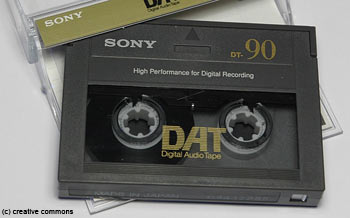6. Magnetic Tape
The amount of work that you do on your computer at home can easily be backed up onto a CD-RW, CDROM, DVD or a memory stick. However, many organisations, such as your school or an office, need to back up large volumes of data each day. CD-RW, DVD-RW or flash memory sticks are unlikely to be large enough for doing this.
Large organisations who need to back up their systems daily tend to use magnetic tapes to store their data. 
Magnetic tapes can store up to one terabyte of uncompressed data - as much as can be stored on a hard disk.
Magnetic tape uses 'serial access' to find a piece of data. This means that to find a specific piece of data, the tape reader has to start at the beginning of the tape and continue fast forwarding until it gets to the piece of data that needed.
Serial access makes it fairly slow to find and retrieve data so it would not be much use to store data that you needed to get hold of quickly. However, magnetic tape is excellent for archiving data i.e. data not likely to be needed instantly.
Large companies such as a television network have robot storage libraries. This consists of shelf upon shelf of magnetic tapes under the control of a robotic arm. If an archive tape is needed, the robot fetches it from the store and places it in a tape reader. The robot also handles the data recording as well.
| Advantages of magnetic tape | Disadvantages of magnetic tape |
|---|---|
| Probably the cheapest form of storage per megabyte of storage | Serial access so can be quite slow to access data |
| Can store large amounts of data - up to 1 Terabyte per tape cartridge | Need a special piece of equipment to record and read the data on the tape |
| Can be set up to do the back up overnight or over the weekend | The data may be corrupted if the tape is placed near a strong magnetic field e.g. a large speaker or magnet |
| Property | Notes |
|---|---|
| Type of storage | Magnetic |
| Data access | Serial access (unlike the direct access of a hard disk) |
| Cost of storage | This is probably the most cost effective method of storing data which is why it is the technology choice for archiving data. |
| Capacity | Can be a Terabyte or more |
| Speed | The slowest of all of the storage media from which to access data, which is why it is fine for archiving but not for immediate data retrieval. |
| Portability | The magnetic tape itself is fairly small and would fit into a pocket or bag. However, in order to be read, an external tape drive is required. Thus, this form of storage is not considered to be very portable. |
| Durability | Although data can be saved to and erased from the tape many times, each tape does have a limited life span and eventually the quality of the data storage will decline. However if a tape is only used once for archiving, then it will last many years, typically 15 years. But of course you also need to keep the tape reading equipment that can read back the data for that time as well. Needs to be protected from extremes of heat. |
| Reliability | As long as it is not damaged, a magnetic tape is very reliable method of data storage. |
Challenge see if you can find out one extra fact on this topic that we haven't already told you
Click on this link: Magnetic Tape
